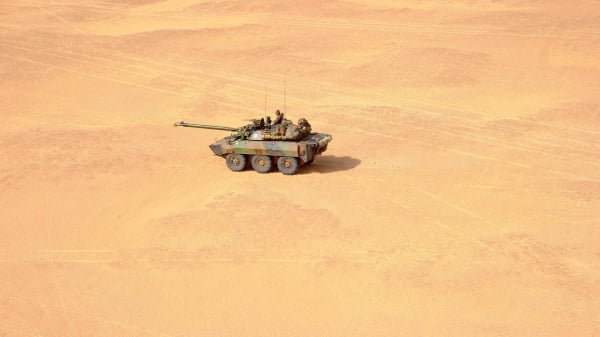
With the French military intervention in Mali shifting to a more sustained action, the reality of the long, hard slog in the Mali region has triggered inevitable questions by diplomats, policy planners and many others as to what defines success – and what comes next?
Most mouthed answer: “Somalia.”
That’s correct. The place where humanitarian intervention went bad in a major way, where Black Hawk Down became a symbol of how fraught Africa intervention can be that it scored America so badly that the U.S. sat back and watched Rwanda bleed and did all it could to avoid intervention, is now seen as the template solution for Mali.
This really does stop one in the tracks.
Yet on occasion reality demands action. And the successes, as they are, are few and far between.
A classic failed state, Somalia was a hub and major enclave for al-Qaeda. The West, with African help, tried repeatedly to turn things around, and suddenly the right mix appeared. A combined military and diplomatic effort got democracy back in Somalia and al-Qaeda on the defensive. Earlier this year, the U.S. formally recognized the government of Somalia for the first time in more than two decades.
Success! At least for the moment.
For years, Somalia looked similar to how Mali was in January. The al-Qaeda affiliate al-Shabaab controlled a vast territory, was able to implement its harsh version of sharia law, and easily struck outside the country’s borders. But then al-Shabaab mishandled the 2011 drought that wracked the region, exacerbating the crisis by accusing humanitarian organizations of trying to spread Christianity then ejecting them from areas it controlled. Meanwhile, the U.S. developed a strategy for reversing al-Shabaab’s gains that included supporting African Union counterinsurgency efforts and recruiting Somali groups to to function as proxies against the extremists, building an indigenous Somali intelligence network, and employing “decapitation” strikes (often employing drones) against al-Shabaab leaders.
http://www.usnews.com/news/articles/2013/01/16/us-official-mali-success-should-be-shaped-by-somalia
Defeated in Somalia, al-Qaeda found Mali, which became the biggest territory held by al-Qaeda and its allies. “Al-Qaeda never owned Afghanistan,” said former United Nations diplomat Robert Fowler, a Canadian kidnapped and held for 130 days by al-Qaeda’s local chapter. “They do own northern Mali.”
That was before the French action. Yet al-Qaeda in the Islamic Maghreb, known as AQIM, still operates not just in Mali, but also in a 7,000-kilometer long ribbon of land that runs across the widest part of Africa and includes sections of Mauritania, Niger, Algeria, Libya, Burkina Faso and Chad.
Experts caution in assuming that what seemed to work in one part of Africa will work in another. It is difficult to suppress a group roaming around in the Sahara; also, unlike the focused militaries of Uganda and Kenya that played such an important role in Somalia, Mali’s neighbors are, in the best of times, fragile states with extremely limited political and military capacities. The strong nations have yet to contribute troops.
http://allafrica.com/stories/201302250069.html
That was highlighted over the weekend when more than a dozen Chadian soldiers were killed in clashes with al-Qaeda, the heaviest single incident losses by African troops since the campaign began six weeks ago.
http://www.reuters.com/article/2013/02/24/us-mali-rebels-chad-idUSBRE91N09A20130224
The Somalia success of the moment needs to be leavened with the yeast of recent history. For example, the Ethiopian invasion of Somalia in 2006 appeared successful for a short time — that is, before the insurgency sparked. Afghanistan burst as a shimmering success after the U.S.-backed Northern Alliance quickly displaced the Taliban following the 9/11 attacks, but preventing the Taliban’s resurgence has been elusive. Iraq, of course, is fraught with issues, despite the somewhat rapid fall of Saddam Hussein’s regime.
In some years, we may see that the current talk of Somalia as a template will appear every bit as wishin’ and hopin’ and thinkin’ and prayin’ as the talk in 2003 that the Iraq war was the ideal way for the U.S. to remove Middle Eastern dictators.
Yet we like how one size must fit all, even if forced to fit. Other than the Philippines success right after the 9/11 attacks, the U.S. antiterrorism schemes have fallen short.
The U.S. African Command, independent since 2008, still does not have a physical home on the continent – no country will take it – but the U.S. is opening its third drone base on the continent, this time in Niger’s capital, Niamey. Military officials would like to eventually move it north to the city of Agadez, which is closer to the parts of Mali where al-Qaeda cells have taken root, but “not [it’s] feasible at this point.”
The jihadists already distribute tip sheets on how to avoid drones.
New page in an undefined war, new style — the question remains, new outcome? Conventional wisdom is often the drug of failure.
(Photo credit: PASCAL GUYOT / AFP / Getty Images)